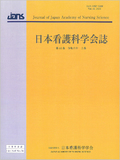Japanese
English
- 販売していません
- Abstract 文献概要
- 参考文献 Reference
要旨
目的:階段昇降運動負荷中に呼息意識呼吸を行うことが運動負荷後における呼吸状態および下肢疲労感に与える影響を明らかにすることである.
方法:準実験研究.大学4年生18名を対象とし任意呼吸(自然にしている呼吸)および呼息意識呼吸の2種類の呼吸様式で,Master2階段試験を実施した.テレメトリー式生体信号測定装置で呼吸数,脈拍数,呼吸状態(吸息呼息時間),SpO2,呼吸の回復時間,呼吸困難感,下肢疲労感を測定し比較した.
結果:階段昇降運動負荷後の呼吸困難感(p=.012),下肢疲労感(p=.025)ともに任意呼吸に比べて呼息意識呼吸の方が有意に低かった.呼吸の回復時間は任意呼吸に比べて,呼息意識呼吸の方が有意に18.5秒短かった(p=.026).
結論:呼息意識呼吸は,任意呼吸に比べ,階段昇降運動後の呼吸困難感,下肢疲労感を軽減し,呼吸の回復時間を短縮させることが示唆された.
Objective: To compare respiratory status during voluntary breathing and expiratory awareness breathing based on subjective and objective indicators and investigate their effect on post-stair climbing exercise respiratory recovery.
Methods: In this quasi-experimental study, 18 university seniors underwent the Master's twostep test in two breathing conditions: voluntary breathing(natural breathing) and expiratory awareness breathing. Respiratory rate, heart rate, respiratory status (inspiratory-expiratory time), SpO2, respiratory recovery time, breathlessness, and lower limb fatigue were measured and compared using telemetry-based physiological signal monitoring.
Results: According to post-stair climbing exercise Borg scale scores, breathlessness(p = .012) and lower limb fatigue(p = .025) were significantly lower in the expiratory awareness breathing condition than in the voluntary breathing condition. The respiratory recovery time was significantly shorter in expiratory awareness breathing by 18.5 s(p = .026) than in voluntary breathing.
Conclusion: Expiratory awareness breathing suggests a reduction in post-stair climbing exercise breathlessness and lower limb fatigue compared with voluntary breathing, along with a shortened respiratory recovery time.
Copyright © 2024, Japan Academy of Nursing Science. All rights reserved.


